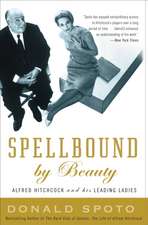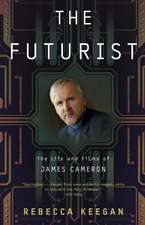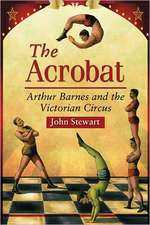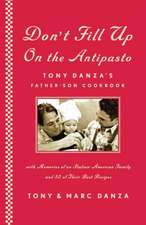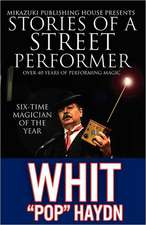I'd Like to Apologize to Every Teacher I Ever Had: My Year as a Rookie Teacher at Northeast High
Autor Tony Danzaen Limba Engleză Hardback – 10 sep 2012
Entering Northeast’s crowded halls in September of 2009, Tony found his way to a classroom filled with twenty-six students who were determined not to cut him any slack. They cared nothing about “Mr. Danza’s” showbiz credentials, and they immediately put him on the hot seat.
Featuring indelible portraits of students and teachers alike, I’d Like to Apologize to Every Teacher I Ever Had reveals just how hard it is to keep today’s technologically savvy ߝ and often alienated -- students engaged, how impressively committed most teachers are, and the outsized role counseling plays in a teacher’s day, given the psychological burdens many students carry. The book also makes vivid how a modern high school works, showing Tony in a myriad of roles ߝ from lecturing on To Kill a Mockingbird to “coaching” the football team to organizing a talent show to leading far-flung field trips to hosting teacher gripe sessions.
A surprisingly poignant account, I’d Like to Apologize to Every Teacher I Ever Had is sometimes laugh-out-loud funny but is mostly filled with hard-won wisdom and feel-good tears.
Preț: 144.38 lei
Nou
Puncte Express: 217
Preț estimativ în valută:
27.63€ • 28.68$ • 23.04£
27.63€ • 28.68$ • 23.04£
Carte indisponibilă temporar
Doresc să fiu notificat când acest titlu va fi disponibil:
Se trimite...
Preluare comenzi: 021 569.72.76
Specificații
ISBN-13: 9780307887863
ISBN-10: 0307887863
Pagini: 272
Dimensiuni: 162 x 238 x 23 mm
Greutate: 0.46 kg
Ediția:New.
Editura: Crown Archetype
ISBN-10: 0307887863
Pagini: 272
Dimensiuni: 162 x 238 x 23 mm
Greutate: 0.46 kg
Ediția:New.
Editura: Crown Archetype
Cuprins
Preface
FIRST SEMESTER
1. You're Fired, Go Teach
Teachers Lounge: Lesson Plans
2. Ignorance Is No Excuse
Teachers Lounge: The Real Deal
3. Do Now
Teachers Lounge: Everybody Cries
4. The Half-Sandwich Club
Teachers Lounge: Bobby G
5. Making the Grade
Teachers Lounge: No Fear Shakespeare
6. Never Smile Before Christmas
Teachers Lounge: Northeast's Got Talent
SECOND SEMESTER
7. Field Tripping
Teachers Lounge: Gone Bowling
8. Poetic Justice
Teachers Lounge: Happy Hour
9. Our Atticus
Teachers Lounge: Adequate Yearly Progress
10. Spring Fever
Teachers Lounge: Fight Night
11. Finals
Teachers Lounge: The Sons of Happiness
12. If…
Teachers Lounge: Saving Starfish
EPILOGUE
Acknowledgments
FIRST SEMESTER
1. You're Fired, Go Teach
Teachers Lounge: Lesson Plans
2. Ignorance Is No Excuse
Teachers Lounge: The Real Deal
3. Do Now
Teachers Lounge: Everybody Cries
4. The Half-Sandwich Club
Teachers Lounge: Bobby G
5. Making the Grade
Teachers Lounge: No Fear Shakespeare
6. Never Smile Before Christmas
Teachers Lounge: Northeast's Got Talent
SECOND SEMESTER
7. Field Tripping
Teachers Lounge: Gone Bowling
8. Poetic Justice
Teachers Lounge: Happy Hour
9. Our Atticus
Teachers Lounge: Adequate Yearly Progress
10. Spring Fever
Teachers Lounge: Fight Night
11. Finals
Teachers Lounge: The Sons of Happiness
12. If…
Teachers Lounge: Saving Starfish
EPILOGUE
Acknowledgments
Recenzii
“Breezy…Danza is able to shed light on a number of the underreported struggles teachers face.”
--Booklist
“In this endearing memoir, Danza defies expectations…[filled with] refreshing honesty…provides insights into a teacher’s daily life.”
--Publishers Weekly
“A witty, self-deprecating, and charming account of how being a teacher extends far beyond the four walls of a classroom. From sweating through his shirt to harboring adoption fantasies, Tony Danza depicts his brutally and beautifully real experience as a first-year high-school teacher. With humor and honesty, he highlights the emotional toll of teaching and describes how one of the most important careers in America is still one of the most unappreciated.”
--Erin Gruwell, author of the #1 New York Times bestselling The Freedom Writers Diary
“At age 59 Tony Danza inexplicably chose to become a teacher at a tough, inner-city school. The story he tells is moving, eye-opening, and compellingly honest. Love infuses his work, and he cries a lot. Read this book and you will too.”
--Joel Klein, former New York City Schools chancellor
“It takes a lot of courage to stand in front of a group of teens and proclaim yourself their teacher. It takes even more to be a good one -- someone who sees each student as an individual with a unique life story. Tony Danza put himself forward to teach children and learn from them, knowing that the more he really understood these kids the better teacher he could be for them. We easily forget how truly difficult it is to be a transformational teacher and in these pages you can see that’s what he became.”
--Rosalind Wiseman, New York Times bestselling author of Queen Bees & Wannabees
“Tony Danza is filled with life, joy and the spirit of altruism ߝ which makes him a natural teacher, as well as a perfect witness to the victories and tragedies in today’s inner-city classroom. Like teaching itself, this book is an emotional roller-coaster ߝ but it’s also a sobering account of the perilous state of schools in our poor communities. This is a must-read for anyone who cares about the future of the nation’s children.”
--Geoffrey Canada, President and CEO, Harlem Children’s Zone
“I highly recommend I’d Like to Apologize to Every Teacher I Ever Had to everyone who has thought about teaching as an encore career ߝ and anyone who wants to know what life is like for teachers and students in American public school classrooms today. Tony’s book will make you laugh, cry, and cheer. It serves as a call to action for every one of us to take a stand and commit to the education of our young people.”
--Sherry Lansing, Former CEO of Paramount Pictures and Founder of The Sherry Lansing Foundation
"A great antidote to all those pieces by folks who consider teaching glorified babysitting."
--Library Journal
--Booklist
“In this endearing memoir, Danza defies expectations…[filled with] refreshing honesty…provides insights into a teacher’s daily life.”
--Publishers Weekly
“A witty, self-deprecating, and charming account of how being a teacher extends far beyond the four walls of a classroom. From sweating through his shirt to harboring adoption fantasies, Tony Danza depicts his brutally and beautifully real experience as a first-year high-school teacher. With humor and honesty, he highlights the emotional toll of teaching and describes how one of the most important careers in America is still one of the most unappreciated.”
--Erin Gruwell, author of the #1 New York Times bestselling The Freedom Writers Diary
“At age 59 Tony Danza inexplicably chose to become a teacher at a tough, inner-city school. The story he tells is moving, eye-opening, and compellingly honest. Love infuses his work, and he cries a lot. Read this book and you will too.”
--Joel Klein, former New York City Schools chancellor
“It takes a lot of courage to stand in front of a group of teens and proclaim yourself their teacher. It takes even more to be a good one -- someone who sees each student as an individual with a unique life story. Tony Danza put himself forward to teach children and learn from them, knowing that the more he really understood these kids the better teacher he could be for them. We easily forget how truly difficult it is to be a transformational teacher and in these pages you can see that’s what he became.”
--Rosalind Wiseman, New York Times bestselling author of Queen Bees & Wannabees
“Tony Danza is filled with life, joy and the spirit of altruism ߝ which makes him a natural teacher, as well as a perfect witness to the victories and tragedies in today’s inner-city classroom. Like teaching itself, this book is an emotional roller-coaster ߝ but it’s also a sobering account of the perilous state of schools in our poor communities. This is a must-read for anyone who cares about the future of the nation’s children.”
--Geoffrey Canada, President and CEO, Harlem Children’s Zone
“I highly recommend I’d Like to Apologize to Every Teacher I Ever Had to everyone who has thought about teaching as an encore career ߝ and anyone who wants to know what life is like for teachers and students in American public school classrooms today. Tony’s book will make you laugh, cry, and cheer. It serves as a call to action for every one of us to take a stand and commit to the education of our young people.”
--Sherry Lansing, Former CEO of Paramount Pictures and Founder of The Sherry Lansing Foundation
"A great antidote to all those pieces by folks who consider teaching glorified babysitting."
--Library Journal
Extras
One
You’re Fired, Go Teach!
Room 230. First day of school. I unlock the door and try to wrap my head around what’s about to happen here . . . in my classroom . . . where I’m Mr. Danza. That Mister alone takes some getting used to—a whole different kind of Boss. At Philadelphia’s Northeast High, only my fellow teachers get to call me Tony. School rules. This gig isn’t acting, it’s for real. Real kids, real lives, real educations at stake. And any minute now my students are going to walk through that door.
Engage the students. The mantra that was drilled into my head during teacher orientation starts playing like a bass drum in my chest. One of my instructors rolled her eyes when she said it, and then she added, “No one ever seems to question why the burden is all on the teacher to do the engaging, when we ask so little of the students, or for that matter, their parents.”
Her vehemence startled me. “I never thought of it that way,” I told her.
“No,” she said, not unkindly. “But I promise, you will.”
It’s stifling. I turn on the AC—a luxury I’m grateful for—and double-check my room. It looks as good as I could possibly make it in my week of prep. The institutional beige cinder-block walls and the desktops are scrubbed so clean even my mother would approve. I dusted the bookshelves, squeegeed the windows, and installed dispensers of hand sanitizer by each door—an attempt to defend my students against the swine flu epidemic that’s threatening the nation. This last touch, I hope, will show the kids that I sincerely care about their well-being and not that I’m a germ freak. I’ve also decorated the walls with fadeless blue paper and encouraging banners, which say things like the only place success comes before work is in the dictionary and my favorite, no moaning, no groaning—if only I could follow that advice myself! Above the blackboard, I’ve glued big letters to spell out: take part in your own education. And on the wall are listed my class rules:
1. BE here, on time and prepared
2. BE kind
3. BELIEVE
I try to shrug off the advice of a veteran teacher I met last week at Becker’s, the local school supply warehouse where I bought all this signage. He was a sweet-faced guy, moonlighting as a checkout clerk to make ends meet—so much for those “outrageous” public school salaries—and he immediately marked me as a novice. His tip-off was the huge pile of educational decorations I was charging to my own credit card. Philadelphia teachers receive only a hundred dollars each for classroom supplies for the whole year; obviously I was way over budget in more ways than one. So this veteran offered a tactic to save my skin. “Never smile before Christmas,” he warned. “Smiling puts you at their mercy, they’ll eat you alive.”
Fortunately, before I can dwell on this memory, the bell rings. Actually, it screams like an air-raid siren. But then, the strangest thing happens. Outside, the hallways are bedlam, but in my classroom dead quiet reigns, even after the first student walks in. She’s small and neat, wearing jeans, a white T-shirt, and a plastic headband. She bounces a little on the balls of her feet and grins at me, but doesn’t make a sound.
I have a big mouth, which is how this whole thing got started.
In 2007 I was two years into my dream job—hosting a live, one-hour TV talk show in New York City. It aired from ten to eleven every weekday morning on the ABC network, right after Live! with Regis and Kelly and before The View. I felt like the king of New York. The show not only gave me a window into the true complexity of the greatest city on earth but also offered a platform for me to do some serious good. One of my favorite segments was our “School Room Makeovers.” The producers would enlist charitable corporations to donate much-needed school equipment, and then we’d take a camera crew into an impoverished school and remake the science lab, gym, art room, or reading room. When we learned that the music department in one school had just six instruments for four hundred kids, we approached Casio and C. G. Conn and acquired keyboards and brass instruments. We rebuilt and reequipped the music room, and that school now has a fine jazz orchestra. Given half a chance, I’d have leveraged my show to rebuild all the public schools in New York. Unfortunately, my show was canceled.
Now just about every TV actor has had a show canceled—it’s a basic occupational hazard. But this time, for me, was different. After the show ended, my wife and I separated. We’d been married twenty years. And only the youngest of my three kids was still living at home back in Los Angeles. Plus, I could smell sixty.
Sixty’s over the speed limit. My dad only lived to be sixty-two. Suddenly, it hit me that I could be running out of time, and this realization made me begin to consider a serious change of direction. I thought about the reasons I’d been so proud of that talk show, and it occurred to me that when we made over all those schoolrooms, I wasn’t only trying to address the problem of underfunded schools, but also reaching for a thread that ran all the way back to my own school days. My original career plan in college was to teach. I actually have a degree in history education. After graduation I got rerouted, first into boxing, then into acting, but it was no accident that my character on Who’s the Boss? ultimately became a teacher. I was still trying to live out my early vocational dream. But playing a teacher on television could never compare with teaching for real. Maybe now was the time to stop, regroup, and get back to the road not taken. The classroom wasn’t yet closed to me. I could still make a contribution. Sure I could. Do something that would make my own kids truly proud of me.
What kicked me into gear was a documentary made by Teach for America, the organization that trains college graduates to teach in rural and urban public schools. The film focused on some TFA teachers in Baltimore, Maryland, and culminated with a rousing school production of Bye Bye Birdie. As a song-and-dance man, I can always be had for a musical, and the energy and passion of the kids in the film were truly impressive. But what throttled me was the camera’s pan to the audience as the cast was taking a bow at the end of the show; there were maybe seven people there to applaud those kids. As a parent, I’d volunteered to help out on numerous theatrical productions with my own kids; in the private schools that they were fortunate enough to attend, I’d never seen a performance that did not have a packed audience of family, friends, and teachers. But in this inner-city school, no one was there to support the kids. That really got to me. I wanted to help.
I looked into TFA and learned that, technically, I qualified to apply. To be honest, though, the prospect of beginning a third-act career scared me almost as much as it attracted me. Could I really do this, after so many years? I didn’t know. But if I told my friends this was what I was planning, then I wouldn’t let myself back out. So I opened my big mouth.
In New York, I mentioned my youthful dream to the executive producer of my former talk show. He’s young, hip, and savvy, and when I said I was thinking of giving up acting to become a teacher, he didn’t miss a beat. “Ever think of doing that as a reality show?”
At first the idea repelled me. I’m no fan of reality TV in general, and the idea of a reality series about teaching immediately put me off. I wanted to teach instead of acting, not in combination with showbiz. Besides, this would involve actual students and their actual education. As far as TV producers are concerned, the sizzle of drama is always paramount, and that goes double—or maybe triple—for reality TV producers. A classroom reality show was bound to compromise the students at best, or at worst exploit them. Either way, I wanted nothing to do with it. “Even if it received great ratings,” I told my friend, “if the students didn’t get the quality of teaching they needed and deserved, then I’d consider the whole exercise a failure.” And there’s no way the kids would come first in a TV show. Ratings always come first. As far as I was concerned, this was a nonstarter.
A few weeks later, though, I got a call from Leslie Grief, another producer friend. Les has had a string of reality TV hits, so I should have known that when I mouthed off to him about making teaching my next act, he, too, would suggest, “That might make a good TV show.” I told him that even if we could do it as a TV show, which I didn’t think we could, we’d never sell it to a network. Never say never to Leslie Grief. Before hanging up, he bet me he could sell the idea to a network in the next half hour. Twenty minutes later the phone rang.
“Congratulations,” Les said. “You owe me. We’re meeting with A&E next week to discuss your new show about teaching.”
My new show about teaching. I had to admit, I liked the sound of that. My resolve began to waver. If we actually could find a way to do this responsibly, the show had the potential to produce a win-win-win-win—for students, teachers, the network, and me. Not only would I have the chance to test myself for real in the classroom but we could showcase what teachers are really up against in public school systems today, and what kids really need that they are and aren’t getting from our schools. Perhaps most important, if I succeeded, we might inspire others to join the teaching profession.
The kind of show I envisioned would be risky for the network, but I was convinced that the real lives of real kids combined with my hyperreal flop sweat as a novice teacher would make for more than enough drama. Responsible reality. That actually had a good ring to it.
We met with three A&E execs at Sparks Steak House in New York. It was a meeting I welcomed, but as we were seated, I remembered that a famous Mafia hit had occurred just outside. I hoped this place wasn’t jinxed. A steak house for lunch would not have been my pick in any case. But Les was in high gear, and when Leslie is on, he’s the reincarnation of P. T. Barnum—a consummate salesman and promoter.
I let him grease the wheels but interrupted to spell out my ground rules before he got carried away. The norm in reality TV is to soft-script the show, which means that you write the story line first, then induce the characters to make the story happen in “reality.” It’s easier and more cost-effective than a straight documentary approach, but I wanted nothing to do with that. “In our show,” I said, “the kids have to come first, no matter what production problems we encounter. We shoot it like a documentary. No scripting. No forced or fake drama. We turn on the cameras, see what happens, then create the shows out of the footage, not the other way round.”
The executives exchanged doubtful glances. My vision was by no means an easy sell, but Les made sure the execs understood we were dealing with a hot commodity. “Education is all we talk about in this country,” he said. “Every presidential candidate promises to be the ‘Education President,’ but the problems keep getting worse. Why aren’t our kids learning? That’s our topic.”
While slicing into our steaks, we jabbered some more about the positive takeaways from the show. The conversation was more animated than I’d expected, and when I sensed that these executives could be won over, I sprang my closing argument. “One more thing,” I said. “Let’s be honest. Many of us think that inner-city kids are somebody else’s problem. Your kids and mine go to private schools and are doing just fine. But America’s public school kids are our kids, too, and these kids are going to grow up to be the majority of America’s adults. What America looks like ten, twenty years from now will depend a lot on whether these kids are educated or not, happy or not, successful or not. How do we sustain a great country without education?” I paused for a second, then felt unexpected emotion as I said, “I think we. . . could actually help.”
The network execs looked at each other. Then their senior guy leaned across the table and skewered me. “Can you keep spouting that dewy-eyed passion in front of a classroom full of unruly teenagers who want to eat you for lunch?”
I grinned. “I’ll make a bet with you. Win, lose, or draw, I’m going to be in that classroom for at least one solid school year.Cameras or no cameras, once I’ve got students who expect me to teach, I’ll be there every day, and I’m going to try my hardest to be the best teacher they ever had. That’s what I mean by responsible reality.”
It took several more meetings and a lot more spouting, but in the end, the network executives assured me that we would do it right, and I vowed to hold them to their word. Whether I had what it takes to actually teach was a whole other issue.
“What’s your name?” I ask the grinning young lady now standing in my classroom doorway. Learn your students’ names, I remind myself as the first-day jitters take hold. It lets them know you care.
“Nakiya.” She shakes my extended hand with a look that tells me I’m already violating protocol. Nuh-kie-uh, I repeat to myself, and decide to call her Nicky.
A big kid named Daniel saunters in next. He oozes cool, and when I direct him and Nakiya to the hand sanitizer dispensers, he raises both eyebrows as if I’ve just belched. “Do me a favor,” I cheer him on. “Whenever you come in, sanitize your hands. Now take a seat and write your name on the card there on your desk.” Then, as Daniel and Nicky reluctantly obey, I position myself at the door to welcome the rest of the class and ask them, too, to sanitize before we get started. The kids all exchange the same look: this guy is nuts, a germ freak, no less.
You’re Fired, Go Teach!
Room 230. First day of school. I unlock the door and try to wrap my head around what’s about to happen here . . . in my classroom . . . where I’m Mr. Danza. That Mister alone takes some getting used to—a whole different kind of Boss. At Philadelphia’s Northeast High, only my fellow teachers get to call me Tony. School rules. This gig isn’t acting, it’s for real. Real kids, real lives, real educations at stake. And any minute now my students are going to walk through that door.
Engage the students. The mantra that was drilled into my head during teacher orientation starts playing like a bass drum in my chest. One of my instructors rolled her eyes when she said it, and then she added, “No one ever seems to question why the burden is all on the teacher to do the engaging, when we ask so little of the students, or for that matter, their parents.”
Her vehemence startled me. “I never thought of it that way,” I told her.
“No,” she said, not unkindly. “But I promise, you will.”
It’s stifling. I turn on the AC—a luxury I’m grateful for—and double-check my room. It looks as good as I could possibly make it in my week of prep. The institutional beige cinder-block walls and the desktops are scrubbed so clean even my mother would approve. I dusted the bookshelves, squeegeed the windows, and installed dispensers of hand sanitizer by each door—an attempt to defend my students against the swine flu epidemic that’s threatening the nation. This last touch, I hope, will show the kids that I sincerely care about their well-being and not that I’m a germ freak. I’ve also decorated the walls with fadeless blue paper and encouraging banners, which say things like the only place success comes before work is in the dictionary and my favorite, no moaning, no groaning—if only I could follow that advice myself! Above the blackboard, I’ve glued big letters to spell out: take part in your own education. And on the wall are listed my class rules:
1. BE here, on time and prepared
2. BE kind
3. BELIEVE
I try to shrug off the advice of a veteran teacher I met last week at Becker’s, the local school supply warehouse where I bought all this signage. He was a sweet-faced guy, moonlighting as a checkout clerk to make ends meet—so much for those “outrageous” public school salaries—and he immediately marked me as a novice. His tip-off was the huge pile of educational decorations I was charging to my own credit card. Philadelphia teachers receive only a hundred dollars each for classroom supplies for the whole year; obviously I was way over budget in more ways than one. So this veteran offered a tactic to save my skin. “Never smile before Christmas,” he warned. “Smiling puts you at their mercy, they’ll eat you alive.”
Fortunately, before I can dwell on this memory, the bell rings. Actually, it screams like an air-raid siren. But then, the strangest thing happens. Outside, the hallways are bedlam, but in my classroom dead quiet reigns, even after the first student walks in. She’s small and neat, wearing jeans, a white T-shirt, and a plastic headband. She bounces a little on the balls of her feet and grins at me, but doesn’t make a sound.
I have a big mouth, which is how this whole thing got started.
In 2007 I was two years into my dream job—hosting a live, one-hour TV talk show in New York City. It aired from ten to eleven every weekday morning on the ABC network, right after Live! with Regis and Kelly and before The View. I felt like the king of New York. The show not only gave me a window into the true complexity of the greatest city on earth but also offered a platform for me to do some serious good. One of my favorite segments was our “School Room Makeovers.” The producers would enlist charitable corporations to donate much-needed school equipment, and then we’d take a camera crew into an impoverished school and remake the science lab, gym, art room, or reading room. When we learned that the music department in one school had just six instruments for four hundred kids, we approached Casio and C. G. Conn and acquired keyboards and brass instruments. We rebuilt and reequipped the music room, and that school now has a fine jazz orchestra. Given half a chance, I’d have leveraged my show to rebuild all the public schools in New York. Unfortunately, my show was canceled.
Now just about every TV actor has had a show canceled—it’s a basic occupational hazard. But this time, for me, was different. After the show ended, my wife and I separated. We’d been married twenty years. And only the youngest of my three kids was still living at home back in Los Angeles. Plus, I could smell sixty.
Sixty’s over the speed limit. My dad only lived to be sixty-two. Suddenly, it hit me that I could be running out of time, and this realization made me begin to consider a serious change of direction. I thought about the reasons I’d been so proud of that talk show, and it occurred to me that when we made over all those schoolrooms, I wasn’t only trying to address the problem of underfunded schools, but also reaching for a thread that ran all the way back to my own school days. My original career plan in college was to teach. I actually have a degree in history education. After graduation I got rerouted, first into boxing, then into acting, but it was no accident that my character on Who’s the Boss? ultimately became a teacher. I was still trying to live out my early vocational dream. But playing a teacher on television could never compare with teaching for real. Maybe now was the time to stop, regroup, and get back to the road not taken. The classroom wasn’t yet closed to me. I could still make a contribution. Sure I could. Do something that would make my own kids truly proud of me.
What kicked me into gear was a documentary made by Teach for America, the organization that trains college graduates to teach in rural and urban public schools. The film focused on some TFA teachers in Baltimore, Maryland, and culminated with a rousing school production of Bye Bye Birdie. As a song-and-dance man, I can always be had for a musical, and the energy and passion of the kids in the film were truly impressive. But what throttled me was the camera’s pan to the audience as the cast was taking a bow at the end of the show; there were maybe seven people there to applaud those kids. As a parent, I’d volunteered to help out on numerous theatrical productions with my own kids; in the private schools that they were fortunate enough to attend, I’d never seen a performance that did not have a packed audience of family, friends, and teachers. But in this inner-city school, no one was there to support the kids. That really got to me. I wanted to help.
I looked into TFA and learned that, technically, I qualified to apply. To be honest, though, the prospect of beginning a third-act career scared me almost as much as it attracted me. Could I really do this, after so many years? I didn’t know. But if I told my friends this was what I was planning, then I wouldn’t let myself back out. So I opened my big mouth.
In New York, I mentioned my youthful dream to the executive producer of my former talk show. He’s young, hip, and savvy, and when I said I was thinking of giving up acting to become a teacher, he didn’t miss a beat. “Ever think of doing that as a reality show?”
At first the idea repelled me. I’m no fan of reality TV in general, and the idea of a reality series about teaching immediately put me off. I wanted to teach instead of acting, not in combination with showbiz. Besides, this would involve actual students and their actual education. As far as TV producers are concerned, the sizzle of drama is always paramount, and that goes double—or maybe triple—for reality TV producers. A classroom reality show was bound to compromise the students at best, or at worst exploit them. Either way, I wanted nothing to do with it. “Even if it received great ratings,” I told my friend, “if the students didn’t get the quality of teaching they needed and deserved, then I’d consider the whole exercise a failure.” And there’s no way the kids would come first in a TV show. Ratings always come first. As far as I was concerned, this was a nonstarter.
A few weeks later, though, I got a call from Leslie Grief, another producer friend. Les has had a string of reality TV hits, so I should have known that when I mouthed off to him about making teaching my next act, he, too, would suggest, “That might make a good TV show.” I told him that even if we could do it as a TV show, which I didn’t think we could, we’d never sell it to a network. Never say never to Leslie Grief. Before hanging up, he bet me he could sell the idea to a network in the next half hour. Twenty minutes later the phone rang.
“Congratulations,” Les said. “You owe me. We’re meeting with A&E next week to discuss your new show about teaching.”
My new show about teaching. I had to admit, I liked the sound of that. My resolve began to waver. If we actually could find a way to do this responsibly, the show had the potential to produce a win-win-win-win—for students, teachers, the network, and me. Not only would I have the chance to test myself for real in the classroom but we could showcase what teachers are really up against in public school systems today, and what kids really need that they are and aren’t getting from our schools. Perhaps most important, if I succeeded, we might inspire others to join the teaching profession.
The kind of show I envisioned would be risky for the network, but I was convinced that the real lives of real kids combined with my hyperreal flop sweat as a novice teacher would make for more than enough drama. Responsible reality. That actually had a good ring to it.
We met with three A&E execs at Sparks Steak House in New York. It was a meeting I welcomed, but as we were seated, I remembered that a famous Mafia hit had occurred just outside. I hoped this place wasn’t jinxed. A steak house for lunch would not have been my pick in any case. But Les was in high gear, and when Leslie is on, he’s the reincarnation of P. T. Barnum—a consummate salesman and promoter.
I let him grease the wheels but interrupted to spell out my ground rules before he got carried away. The norm in reality TV is to soft-script the show, which means that you write the story line first, then induce the characters to make the story happen in “reality.” It’s easier and more cost-effective than a straight documentary approach, but I wanted nothing to do with that. “In our show,” I said, “the kids have to come first, no matter what production problems we encounter. We shoot it like a documentary. No scripting. No forced or fake drama. We turn on the cameras, see what happens, then create the shows out of the footage, not the other way round.”
The executives exchanged doubtful glances. My vision was by no means an easy sell, but Les made sure the execs understood we were dealing with a hot commodity. “Education is all we talk about in this country,” he said. “Every presidential candidate promises to be the ‘Education President,’ but the problems keep getting worse. Why aren’t our kids learning? That’s our topic.”
While slicing into our steaks, we jabbered some more about the positive takeaways from the show. The conversation was more animated than I’d expected, and when I sensed that these executives could be won over, I sprang my closing argument. “One more thing,” I said. “Let’s be honest. Many of us think that inner-city kids are somebody else’s problem. Your kids and mine go to private schools and are doing just fine. But America’s public school kids are our kids, too, and these kids are going to grow up to be the majority of America’s adults. What America looks like ten, twenty years from now will depend a lot on whether these kids are educated or not, happy or not, successful or not. How do we sustain a great country without education?” I paused for a second, then felt unexpected emotion as I said, “I think we. . . could actually help.”
The network execs looked at each other. Then their senior guy leaned across the table and skewered me. “Can you keep spouting that dewy-eyed passion in front of a classroom full of unruly teenagers who want to eat you for lunch?”
I grinned. “I’ll make a bet with you. Win, lose, or draw, I’m going to be in that classroom for at least one solid school year.Cameras or no cameras, once I’ve got students who expect me to teach, I’ll be there every day, and I’m going to try my hardest to be the best teacher they ever had. That’s what I mean by responsible reality.”
It took several more meetings and a lot more spouting, but in the end, the network executives assured me that we would do it right, and I vowed to hold them to their word. Whether I had what it takes to actually teach was a whole other issue.
“What’s your name?” I ask the grinning young lady now standing in my classroom doorway. Learn your students’ names, I remind myself as the first-day jitters take hold. It lets them know you care.
“Nakiya.” She shakes my extended hand with a look that tells me I’m already violating protocol. Nuh-kie-uh, I repeat to myself, and decide to call her Nicky.
A big kid named Daniel saunters in next. He oozes cool, and when I direct him and Nakiya to the hand sanitizer dispensers, he raises both eyebrows as if I’ve just belched. “Do me a favor,” I cheer him on. “Whenever you come in, sanitize your hands. Now take a seat and write your name on the card there on your desk.” Then, as Daniel and Nicky reluctantly obey, I position myself at the door to welcome the rest of the class and ask them, too, to sanitize before we get started. The kids all exchange the same look: this guy is nuts, a germ freak, no less.
Notă biografică
TONY DANZA, before he grew up and starred in such classic TV series as “Taxi” and “Who’s the Boss?” as well as on Broadway, was a “discipline problem” at Long Island’s Malverne High School, for which he is deeply apologetic. These days, he divides his time between New York City and Los Angeles.
Descriere
Television, screen, and stage star Danza's absorbing account of a year spent teaching 10th-grade English at Philadelphia's largest high school with 3,600 students. Featuring indelible portraits of students and teachers alike, it reveals just how hard it is to keep today's technologically savvy--and often alienated--students engaged.




